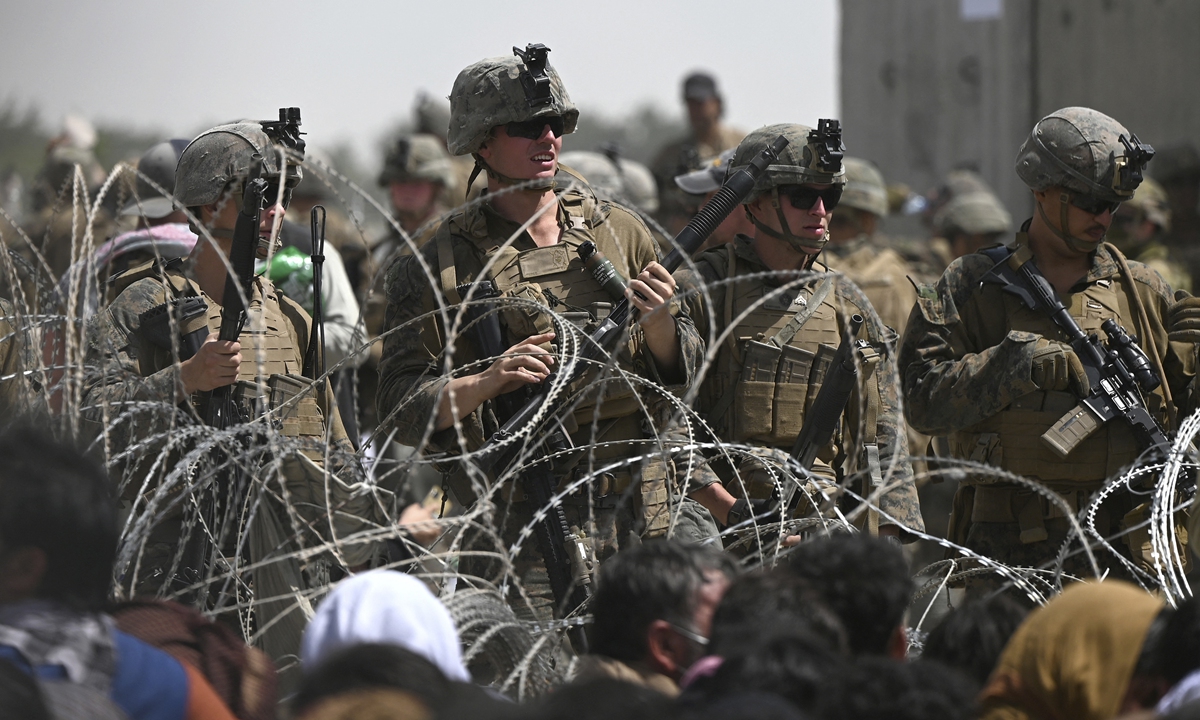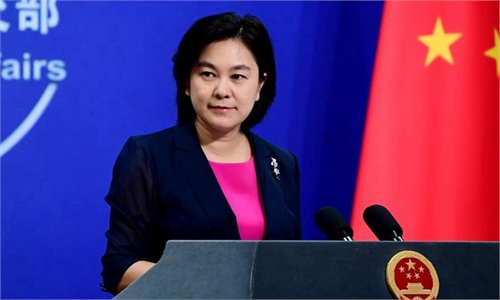
US soldiers stand guard behind barbed wire as Afghans sit on a roadside near the military part of the airport in Kabul on Friday, hoping to flee from the country. Photo: AFP
The US military's withdrawal from Afghanistan is still under way, but how to properly handle the aftermath is a big problem. Kabul airport is filled with both foreign citizens waiting to leave the country and Afghan people who have helped the US military and the US allies. Those Afghan people are broadly classified as refugees by the West. However, there are obviously more refugees who want to leave Afghanistan than those currently trapped in Kabul airport. Who will receive them has quickly become a new international dispute.
The US is willing to accept only a very small number of refugees. Washington hopes that Afghanistan's neighboring countries and European countries will open their doors to accept Afghan refugees, at least for a period of time. Many European countries have refused to do so. They still have lingering fears about the wave of refugees in 2015. Turkey has clearly refused to take in more Afghan refugees. Turkish President Recep Tayyip Erdogan said Turkey is already home to at least 5 million refugees and the country cannot bear an additional "migration burden" by taking in Afghans who worked for Western countries, state-owned Turkish public broadcaster TRT World reported on Monday.
Pakistan and Iran are two neighboring countries of Afghanistan, and respectively host millions of Afghan refugees. They certainly do not want more refugees. Russian President Vladimir Putin on Sunday rejected the idea of sending Afghan refugees and evacuees to Central Asian countries. Residents in those countries can travel to Russia without a visa.
Also, some Western countries are casting their eyes on China, asking whether China intends to accept Afghan refugees during press conferences and other occasions.
Undoubtedly, the US and its allies should take the most responsibility to resettle refugees from Afghanistan. The reason is very simple and valid: The disaster in Afghanistan was caused by the US and its allies. If it were not for their invasion of Afghanistan, there would not have been the last wave of Afghan refugees since the war started. If they had not run away from Afghanistan in such haste, there would not have been the latest flood of refugees.
The situation of emerging Afghan refugees is quite urgent, but the US and the UK want to gang up with other G7 countries to sanction the new Taliban regime. This will, for sure, continue to worsen the situation in Afghanistan and encourage anti-Taliban forces inside the country. As a result, nobody will know when the war will end and when post-war reconstruction will begin. And this will make more Afghans lose faith in the future of their country and will force them to leave their motherland as refugees.
The US and other Western countries owe refugees in the Middle East an apology. What's more, they owe people in the region substantial support for their lives. The previous pattern in the Middle East was disrupted after a series of events, including the US war on terror in Afghanistan in 2001, the overthrow of Saddam Hussein's regime in Iraq, and the "Arab Spring," which led to the wars in Libya and Syria. A series of violent regime changes occurred, and the resource-rich Greater Middle East has become the largest source of refugees in the world.
The US and other Western political leaders have never really reflected on or repented for what they have done in the Greater Middle East. Every action they took has been propagandized as "morally" motivated under the banner of "humanitarianism." But the actual result was that a large number of civilians were killed in the war and countless people lost their homes and were displaced. Their practices run counter to their fancy rhetoric.
Even though the US is withdrawing from Afghanistan, it is reluctant to accept the new political reality in Afghanistan. Washington's primary concern remains how to eliminate the "detrimental" geopolitical impact of the changes in Afghanistan on itself. The well-being of the Afghan people apparently lies far behind this consideration, or even not in US consideration at all.
The trouble the US has created this time and the compensation it should make are obvious. As an old Chinese saying goes, "The monk may run away, but the temple cannot run with him." The international community should ask Washington and its allies who had taken part in the Afghan war to resettle the vast majority of new Afghan refugees, to donate instead of to compensate, and to provide huge funds for urgently needed humanitarian projects in Afghanistan.
If the ruling elites in the US still have any sense of morality and shame, they should not reject making the compensation, nor they should find excuses to dodge the economic and moral debt they owe to the Afghan people.
It is hoped that public opinion in the US and the West will no longer help publicize how the US military stages a "massive humanitarian evacuation" at Kabul airport, where a genuine escape is staged. What Afghanistan needs most now is calm among its people, and indispensable conditions to pave the way for peace and reconstruction.

